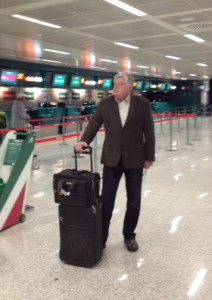Hello from Paris! It’s 12:30 a.m. and I’m out enjoying the wild nightlife.
 Not really. I’m sitting in a very hot, very humid, very closed Charles de Gaulle airport. It has been one of those very wonderful travel days. (Up at 3 a.m. to get to the airport in Bucharest, get on a flight to Paris, sit on the very hot, very humid plane for three hours before they decide it’s broken and they can’t fix it, wait around until after 8 p.m. to catch another flight. My connection left many hours ago. Eventually I will get on a plane to Salt Lake City, which I think is about another 12 hours or something. Oh, the joys of international travel. And let’s not talk about the endless lines, or if there is not a narrow corridor, generally masses of people converging on a target location.
Not really. I’m sitting in a very hot, very humid, very closed Charles de Gaulle airport. It has been one of those very wonderful travel days. (Up at 3 a.m. to get to the airport in Bucharest, get on a flight to Paris, sit on the very hot, very humid plane for three hours before they decide it’s broken and they can’t fix it, wait around until after 8 p.m. to catch another flight. My connection left many hours ago. Eventually I will get on a plane to Salt Lake City, which I think is about another 12 hours or something. Oh, the joys of international travel. And let’s not talk about the endless lines, or if there is not a narrow corridor, generally masses of people converging on a target location.
Forgetting the mess of trying to get home, I have had a very good trip, seeing kids and families in London, Rome, and Bucharest. Got to discover “Old Bucharest” last night with one of our families and earlier in the week to visit their home outside of the city with another of our NACD families. I was really impressed by these folks. They are a lovely bright couple with a beautiful little boy named Tudor, who will be having his first birthday this weekend.
Happy Birthday, Tudor!
As always when I travel in Europe, I am impressed with how tuned in and informed many of the folks are to the rest of the world in comparison to many in the States; and I’m always so impressed by how bi- and multilingual so many of the people are. The wonderful young couple that I was privileged to get to know speak their native Romanian, French, English, and Greek. Perhaps more, but at least those, and they are economists not linguists. Most of the families I met with in Romania spoke very acceptable English.
Historically in the States we do a terrible job of not only teaching other languages, but also of perceiving that we really should do so. Growing up outside of Philadelphia, I had Italian friends whose parents or grandparents spoke Italian, but not one of them learned Italian. And that was often true of others who had family in their homes using their native languages. It would seem to be part of American/English language arrogance.
Languages as they are generally taught in our schools are really pretend, not designed with the intention of teaching you to actually be functional let alone fluent in the language. Typically schools start way too late and the curriculum constructed poorly. After my first year of Spanish in 9th grade, I had learned only one phrase, “Roberto es stupido.” It wasn’t just Roberto who was stupido; so was the teacher and the instruction. I had two years of Spanish in high school and another two years in college, but I think I learned more in a month in Spain than in four years at school. How many people do you know who took languages in school starting in junior or senior high who can actually speak the language? Fortunately many schools, particularly charter and private schools, are doing a much better job now of teaching other languages, starting in Kindergarten and, if possible, earlier and incorporating immersion as a significant focus, if not the focus, of the program.
Beyond the societal issues, research is showing that being bilingual helps build cognitive function and even can slow down Alzheimer’s. We as individuals in the US need to perceive the need to join and understand the rest of the world, to help our children understand that they live in a big world that they need to appreciate, understand, learn from, and join.
We in the US may not teach our children to pay attention to the rest of the world or to speak more than one language, read, or do math very well; but there is something our schools are good at, and evidently better at from my observations, than most of the European countries, and that is how to stand in line. Perhaps really teaching our children to speak another language or two from an early age might be a better focus. Reading would be nice too.
I hate standing in lines, any lines. Perhaps if more people were lousy at it we would find a way to minimize them—a better way. We need lots of better ways. Let’s keep creating them.
